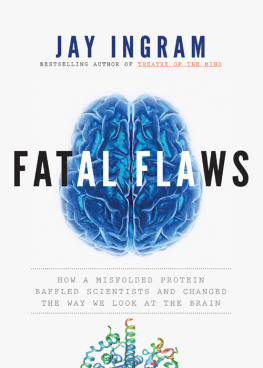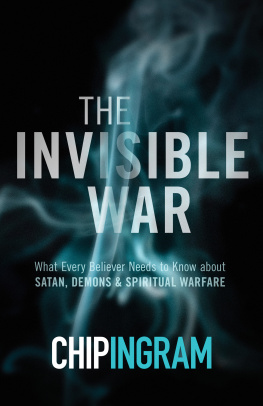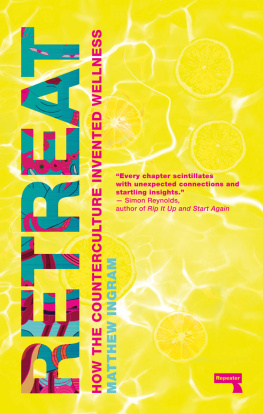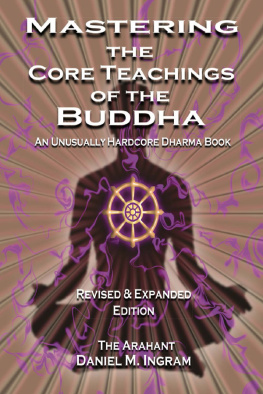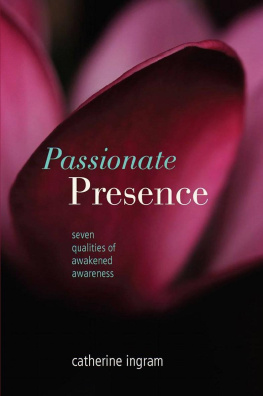Ingram - Theatre of the Mind
Here you can read online Ingram - Theatre of the Mind full text of the book (entire story) in english for free. Download pdf and epub, get meaning, cover and reviews about this ebook. year: 2012, publisher: Harper Collins Canada, genre: Religion. Description of the work, (preface) as well as reviews are available. Best literature library LitArk.com created for fans of good reading and offers a wide selection of genres:
Romance novel
Science fiction
Adventure
Detective
Science
History
Home and family
Prose
Art
Politics
Computer
Non-fiction
Religion
Business
Children
Humor
Choose a favorite category and find really read worthwhile books. Enjoy immersion in the world of imagination, feel the emotions of the characters or learn something new for yourself, make an fascinating discovery.

Theatre of the Mind: summary, description and annotation
We offer to read an annotation, description, summary or preface (depends on what the author of the book "Theatre of the Mind" wrote himself). If you haven't found the necessary information about the book — write in the comments, we will try to find it.
Theatre of the Mind — read online for free the complete book (whole text) full work
Below is the text of the book, divided by pages. System saving the place of the last page read, allows you to conveniently read the book "Theatre of the Mind" online for free, without having to search again every time where you left off. Put a bookmark, and you can go to the page where you finished reading at any time.
Font size:
Interval:
Bookmark:
JAY INGRAM
Theatre of the Mind
Raising the Curtain on Consciousness

To my family
I MAGINE what it would be like to live in a completely different world, an alien place in which you couldnt even know your own mind, a place where, bombarded by sensory stimuli, your mind could extract only the merest hint of the total, and yet you somehow believedor were made to believethat you were all-seeing and all-knowing.
Imagine further that this was a world where you were, in effect, an automaton, a self-deluded one at that, that walked and talked and acted at the behest of a whole set of mental modules whose operations you knew nothing about. Imagine that one of those modules, entirely of its own volition, routinely took the sparse data available to it and concocted bizarre stories to explain what was happening.
Think of a world where an array of photons bombarding the retina becomes a three-dimensional space full of objects and textures, which can then be transformed to an internal image of the same scene, which later, when the brain is in a completely different chemical state, can be brought to mind once again, but this time in a wholly foreign setting.
The strangest thing about this world is that seemingly magical transformations take place: ideas, visions, hallucinations and memories are created by electricity and chemistry, crossing the boundary between the physical and the immaterial in a manner that defies logic and science. The mystery is deepened by the fact that tinkering with the chemistry the electrical circuitry or even the physical substrate of the brain can dramatically change those thoughts and images, without shedding any light at all on how they are created.
Well, look no farther. This is exactly the world that you now inhabit. It is the world of the conscious mind, a world that is not at all what it seems. The science of consciousness has, in the last two decades, transformed our thinking about the brain and how it creates the world you experience.
There are actually several Theatres of the Mind. One is the little theatre in your head that seems to be the place where the events in your conscious mind run, like a never-ending film. It is the home of your minds eye. It is a theatre with an audience of one: you. Only you can tell the rest of us whats playing.
Its one thing for us to feel that way, but sometimes that inner theatre concept worms its way into peoples minds so thoroughly that even researchers seem to be envisioning it when they discuss consciousness. Philosopher Daniel Dennett has spent years skewering this idea of what he dismisses as the Cartesian theatre. He argues that consciousness is not being processed, edited and presented to anyone/anything in the brain. There is no anyone/anythingconsciousness is the end of the line.
Hes been effective. Consciousness experts take pains to dissociate themselves from any notion of an inner theatre, but at the same time, one of the most popular theories of how consciousness works, called the global workspace, is best viewed aswhat else?a theatre, with consciousness being played out on the stage. But it is being played for no one: it just is.
Illuminating the theatre of the mind has become, in the last few years, one of the most challenging and exciting areas of science. That is what this book is about.
T HERE is something unnerving about writing a book about a subject that even the experts cant define. Welcome to consciousness. It really shouldnt be that hard: we may not think much about consciousness, but we all know whats it like not to have it. When you are sleepingas long as youre not dreamingyou are unconscious. If you faint or get knocked out, you lose consciousness. In those situations, as far as you know, there is nothing much going on in your head. Actually, there is much going on in your brain, but you are unaware of it. Awareness and consciousness are closely related, if not synonymous.
Getting knocked out or slipping into deep dreamless sleep are the most common excursions from consciousness, but there are others. If you have a general anaesthetic for surgery, you are unconscious as long as the anaesthetic is in effect. At least, most people seem to be, but there are unnerving reports from patients like this one: I could see the surgeons at the end of the operating table and I thought, ? my God, they are going to operate on me and Im awake. I tried to tell them but I couldnt speakcouldnt move it was the worst experience of my life. Another wrote, The consciousness was terrifying. The desperate animal terror of trying to signal ones conscious state to someone, but unable to twitch a bloody eyelash.
Less dramatically, patients can sometimes remember or recognize certain words that were spoken while they were under the anaesthetic. In extreme cases, derogatory comments made about the patient (This ones todays Blue Plate special) or the alarmed reaction of the surgeons (Gee, this could well be a tumour ) have been linked to delayed postoperative recovery, suggesting that the words were heard in some sense, though they apparently never actually reached consciousness. Sometimes post-operative hypnosis does reveal that the patient did hear and can remember comments made in the OR.
But does this suggest that there is a kind of consciousness while under anaesthesia? Not necessarily. Because muscle relaxants that induce paralysis are given alongside the anaesthetic, patients suffer, as in those real-life accounts, but also are unable to signal in real time that they remain aware, if indeed they are. As a result, scientists are forced to rely either on indirect indicators of consciousness (such as patterns of brain waves) while the patients are apparently knocked out or on the patients memory afterwards, jogged by hypnosis or not. Neither provides the kind of hard and fast reliable data youd like. This is the subjectivity problem that arises again and again in consciousness research: my thoughts and feelings are my own. No matter how cleverly and vividly Im able to describe them to you, that description is necessarily incomplete, my consciousness at least partly inaccessible to you. For all we know we are all completely aware during surgery but forget it all after. Who can prove that wrong?
What about those momentary lapses during freeway driving, in which you suddenly realize that you have no memory of the last ten kilometres? They seem at first glance to be a short-lived version of the same sort of thing, but while you may not remember your driving, you werent unconscious. You were talking on your cellphone, listening to the radio or lost in other thoughts, and each of those requires that you be conscious and attentive to them. The fact that your mind had wandered from the routine of driving to other, more interesting things is a striking example of the ability of consciousness to select or reject whatever mental activities it wishes. It also illustrates how a thought or image can move easily into consciousness or back out of it, taking only fractions of seconds to do so Thats what happens to your awareness of driving, at least for a while.
This doesnt necessarily mean you were accident-prone during that time on the road, although how would you ever be able to find out? Any sudden emergency would snap you back to full consciousness in an instant, and even if it didnt, it likely wouldnt make any difference: your foot would already be on the brake, directed there unconsciously (more about this later). Even if your momentary lack of awareness did cause you to react marginally more slowly, youd likely never know. What would you have to compare that moment with? Its also possible that once you noticed something was happening and snapped back to full awareness mode, any memory that your mind had been wandering might have been erased.
Font size:
Interval:
Bookmark:
Similar books «Theatre of the Mind»
Look at similar books to Theatre of the Mind. We have selected literature similar in name and meaning in the hope of providing readers with more options to find new, interesting, not yet read works.
Discussion, reviews of the book Theatre of the Mind and just readers' own opinions. Leave your comments, write what you think about the work, its meaning or the main characters. Specify what exactly you liked and what you didn't like, and why you think so.

